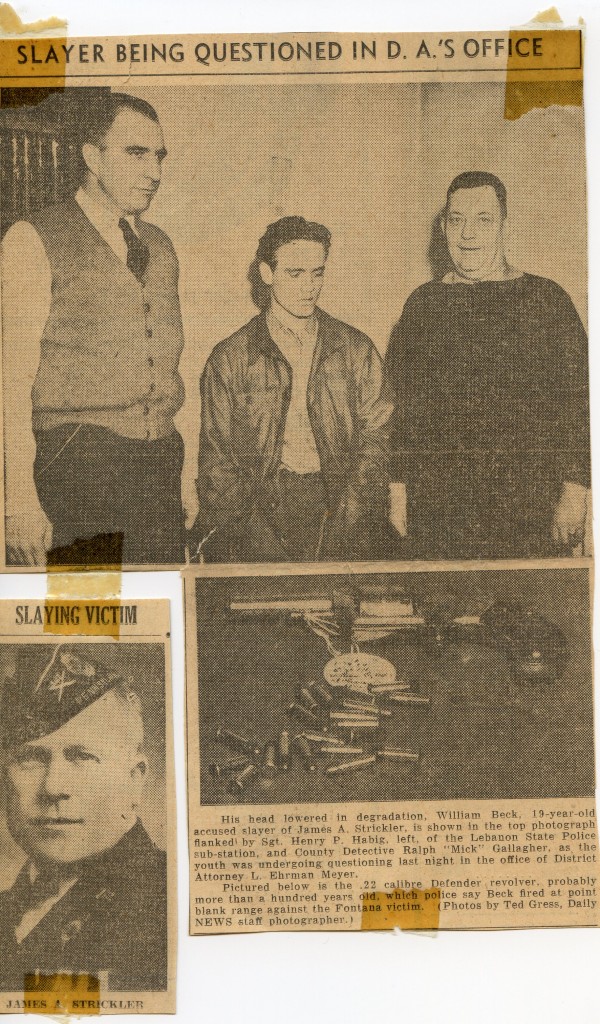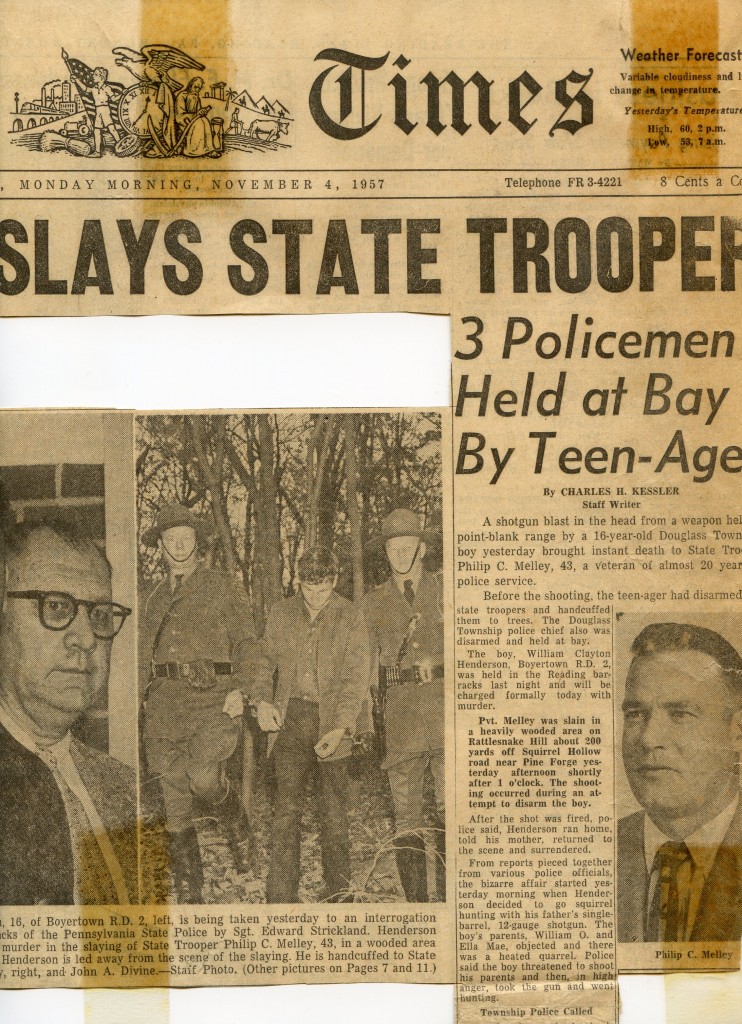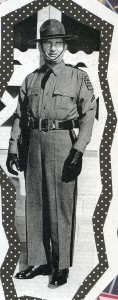My father told me two stories where he had to meet violent antagonists. One deserves its own Post but the other bears his own brand of irony.
A year or two into his career as a police officer, my father and another Trooper were chasing three men in a stolen car. Both cars twisted back and forth at high speed over the back roads of Lebanon County during an afternoon. My father referred to the other trooper (whose name I forget) as a “big Dutchman”, a man much bigger than my father; he was driving.
The stolen car turned into a long driveway, my father’s car following seconds behind. The three thieves rushed from their car into a farm house, leaving the door open behind them. The State car jammed to a halt and my father was out the door and running to the house before his partner could say anything. He ran into the house. The door slammed shut behind him. He heard the lock catch. For two or three very long seconds, he found himself in the middle of a triangle made up of three desperate men. Then “the door came off the hinges and smashed onto the floor and the big Dutchman and I quickly subdued them.” He always laughed when he told this story, bemused by his own rookie mistake and by the big Dutchman roaring into their midst. I love his use of the verb “subdued”. It is a word he would have used in a report, but said with rueful laughter, it summons the reader to understand the quick violence of the confrontation, his admiration for his partner and to his wonderment, all these years later, at the sight of the door leaving its place and his friend magically appearing. For me, there is a comic value to this; it has the quality of a silent movie scene: my father, encircled by rough dressed villains, the close up of his face reading “Uh oh”, the door flying into the air, a red faced slab of beef in a Smokey Bear hat filling the space and then quick efficient mayhem ending with three handcuffed criminals being led away. My father’s laughter signals that he too understood the comic nature of the moment after it was over. No one had been shot. No one had been seriously hurt. He had done something foolish and escaped the consequences. He had completed his job. He had been lucky. He saw enough broken bodies during his 35 years to understand what happens when someone is not lucky.
Central to any police officer’s life and indicative of his character is his reaction to the violence he is paid to confront and stop and whose perpetrators he is duty bound to pursue. My father was no ‘cowboy’. He did not have an ounce of bravado in him. He never spoke of his own use of violence except this one time. His harshest descriptive terms for the worst criminals were “animal” and “sadist”, two words which condemn violence and relegate their users to a moral circle outside of humanity. I also heard him use both words to describe two other troopers – a rare reference but suggestive, I think, of a man aware of the brutality some officers employed.
 He had experience with the worst of all crimes. Three long news articles in The Book describe murders and their agents. *
He had experience with the worst of all crimes. Three long news articles in The Book describe murders and their agents. *
In 1946 a 19 year old AWOL soldier shot a World War I veteran to death in a country store/gas station. William Beck had stolen a car and stopped at Greiner’s store for gas and oil. He did not want to pay for his purchase. He shot James Strickler with a .22 caliber handgun, an antique Defender model that he had bought from a Lebanon High school junior who wanted the $16 to “buy a zoot suit”.
The stories received banner headlines and are at least 5000 words in length. They describe a community where the wife of a farmer “noticed the young man wearing soldier clothing strolling along the road. Mrs. Copenhaver quickly sized up the lad” and “phoned her neighbors to be on the lookout….” A community where every step of his flight and his complete confession were reported in the paper. A community where the wife of the victim, “after picking Beck out of a lineup”, was placed in the same room with him for a confrontation Biblical in its weight and drama:
“The accused youth, wearing an army uniform, sat in a heavy leather chair, slumped back in a detached and disinterested manner. Mrs. Strickler, obviously under great emotional strain, sat halfway across the room from the prisoner and before [the] District Attorney could ask a question blurted out: “Why did you do it?” The dirty and disheveled soldier cast his eyes to the floor and didn’t answer. The widow leaned forward and although her words were choked as she fought back tears, she had a cold disdain in her voice as she said: And I thought you were a poor, cold soldier.”” #
My father is not named in the news story but he was stationed in Lebanon at the time and would have been in on the 24 hour hunt for Beck. I have no doubt that the tone of the story represented his own feelings of anger and disgust at the injustice of the killing and at the moral depravity of the killer – a good man going about his humble job is shot to death by a ‘punk’ for a couple of gallons of gas.
In another clipping from The Book a long story from The Philadelphia Inquirer describes my father’s uncle, a Fairmount Park police officer, and his hand-to-hand combat with a “negro desperado” who had beaten and robbed an old women. That story comes complete with lengthy dialogue between the woman and her abuser that allegedly took place during the commission of the crime.
Salacious in their use of details as all tabloid reporting is, these still retain their power as morality tales, and my father, already the next child in three generations of police officers, was never anything other than a firm believer in order and public safety and in the law’s commitment to their preservation.
On a Sunday morning in November of 1957 William Clayton Henderson, 16, residing near Rattlesnake Hill in Boyertown, had a “heated quarrel” with his parents. He wanted to go squirrel hunting with his father’s “single barrel, 12-gauge shotgun”. His parents objected. “Police said the boy threatened to shoot his parents and then, in high anger, took the gun and went hunting.” His parents called a local officer who found the boy “and attempted to talk him into surrendering the gun”. He failed and called the State Police.
Two Troopers arrived in separate cars. They entered the woods, separated and searched for Henderson. “The teenager, however, got the ‘drop’ on [one Trooper] and ordered him to disarm and surrender his handcuffs.” He handcuffed him to a tree, and when the second Trooper came upon the scene, Henderson threatened to kill the captured Trooper unless he too surrendered his revolver and handcuffs. Henderson then handcuffed him to a tree.
A third officer arrived, Trooper Melley, a 20 year veteran. “The boy saw Melley approaching and told him to halt or he would shoot the other Troopers. Melley tried to talk with the boy, moving closer all the time. Finally, when he was only a few feet away…. Melley lunged at Henderson and the youth fired a point-blank shotgun blast into (Melley’s) forehead, killing him instantly. Henderson then ran to his home, some 200 yards away, told his mother, ran back to the shooting scene and released the handcuffed Troopers.”## Melley was buried in full uniform. Fifty State Policeman formed his Guard of Honor. Another clipping includes a photo of Melley’s funeral. My father was almost certainly there, possibly as a member of the Guard of Honor.
 I don’t remember my father ever speaking of Melley as a friend; I don’t recall the last name as I do so many others, but he knew him; both served together in Troop C in Reading at the same time. I can only imagine that another police officer in confronting the murder of a fellow Trooper would burrow more deeply into a stoical reserve – the job remains, one’s duty remains, and this time it was not me.
I don’t remember my father ever speaking of Melley as a friend; I don’t recall the last name as I do so many others, but he knew him; both served together in Troop C in Reading at the same time. I can only imagine that another police officer in confronting the murder of a fellow Trooper would burrow more deeply into a stoical reserve – the job remains, one’s duty remains, and this time it was not me.
That could have been him. As children I don’t think we ever seriously believed that our father was under a kind of daily potential threat. He came home, removed his gun belt and hung it on a drying rack in the room off the kitchen and became Dad; his uniform only increased his aura of indestructability. I don’t know what went on inside him in his darker hours when he must have thought about such deaths.
RT** shot two men to death in a Green Hills Lake bungalow in Berks County in November of 1962.@ One of the victims accused him of corrupting the morals of his 16 year old daughter. He had been arrested on those charges and fired from his job after this became known. He went to the bungalow seeking to have the charges dropped. There was no discussion. RT suddenly “appear[ed] in the doorway with the rifle”. The daughter who had been assaulted was present. She saw him and screamed a warning. Her father rose from a kitchen table and said,”R., wait a minute. As he spoke the gun was fired….” He fired again. Two shots. He murdered two men and then struck a woman who had been eating with them so hard with his rifle she was admitted to the hospital in serious condition.
His arrest record stretched back over 20 years, including aggravated assault, burglary and over 50 arrests for “hopping rides on freight trains”. He called his wife after the shooting and told her that “he would shoot anyone who would take him,” and that “he didn’t intend to be taken alive.” He was arrested without incident and punished with two consecutive life
sentences.
My father, a Sergeant at this point, was the first to arrive with two troopers. He has 24 years on the Force, a veteran in every way. Since one of the strongest lasting impressions I have of him is of his imperturbability, that is how I imagine him then, looking carefully at the two men, blood all over their shirts, one man’s eyes wide open, and then getting to work.@@ He spoke with witnesses, phoned in RT’s description and license number, and stood watch over the dead while evidence personal did their jobs. Later, he joined in the manhunt.
I was ten years old. I remember my father mentioning that there had been a murder a few miles from our home and that he was helping find the killer. He mentioned it, that’s all. I wanted to know more. He dropped it. I had not known that he had found the bodies.
 Ending in such terrible heartache and waste, all three murders seem stupid, squalid affairs, blundering, thoughtless and densely real. There is not a jot of romance in any of them. My father loved John Wayne and westerns and war movies but never had time for gangsters or movies which gave them prominence. Perhaps because he had seen murder up close and knew what it smelled and looked like, he had no time for its romantic fictions.
Ending in such terrible heartache and waste, all three murders seem stupid, squalid affairs, blundering, thoughtless and densely real. There is not a jot of romance in any of them. My father loved John Wayne and westerns and war movies but never had time for gangsters or movies which gave them prominence. Perhaps because he had seen murder up close and knew what it smelled and looked like, he had no time for its romantic fictions.
*Something to remember – The Book only contains a fraction of all the police work he did over thirty five year. None of us have any idea of how many total cases he handled, of how many arrests he made, murderers he pursued, traffic accidents he investigated. If I am able to find more information in the State Police Archives, more stories will be revealed.
#The DA obviously allowed the reporter to be present during this interview and to write about everything, as if the newspaper were in some way not only the original record responsible for documenting the life of the community in all its particulars, but also a kind of standard bearer for its moral point- of-view. For example, Beck’s entire juvenile file had to have been given to the reporter. His mini-biography charting his descent into criminality begins with his expulsion from the eighth grade and goes on for another 1000 words.
##The Reading Times, November 4, 1957
**I am withholding his name because of the nature of his motive. The woman he abused may be known to someone who reads this.
@The Reading Times, Wednesday, November 28, 1962
@@The Times included detailed, graphic photos, including a full face photo of the daughter.